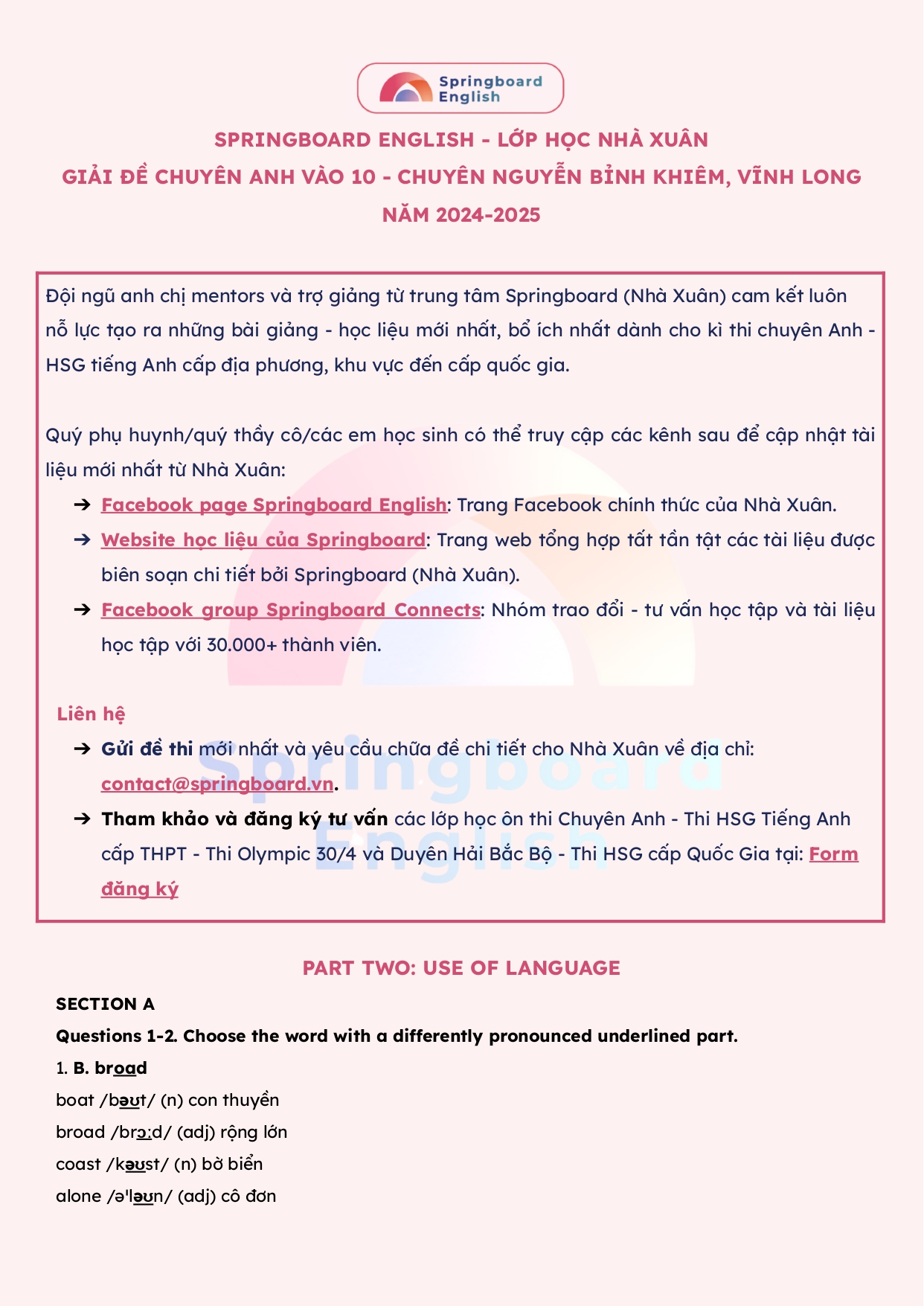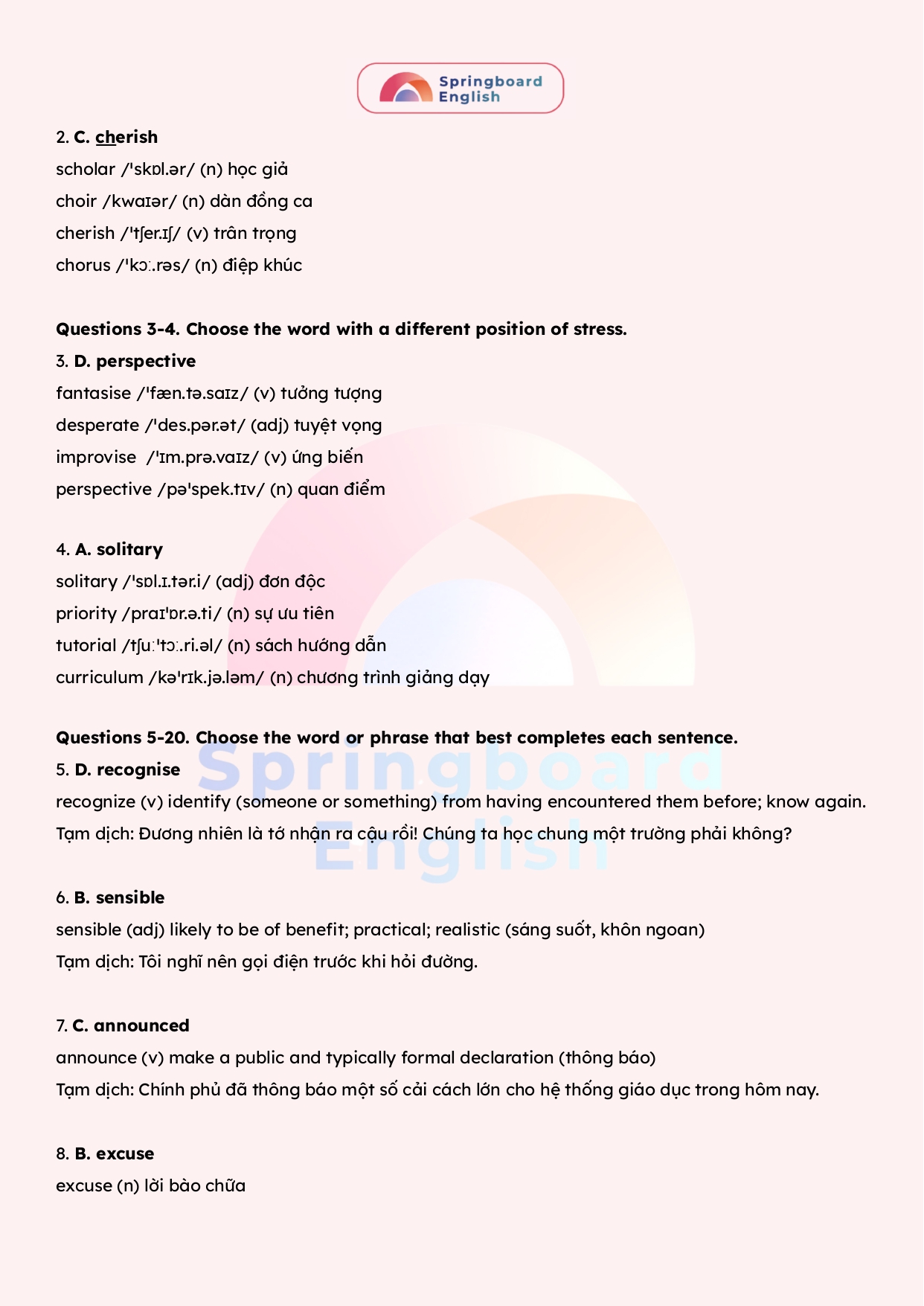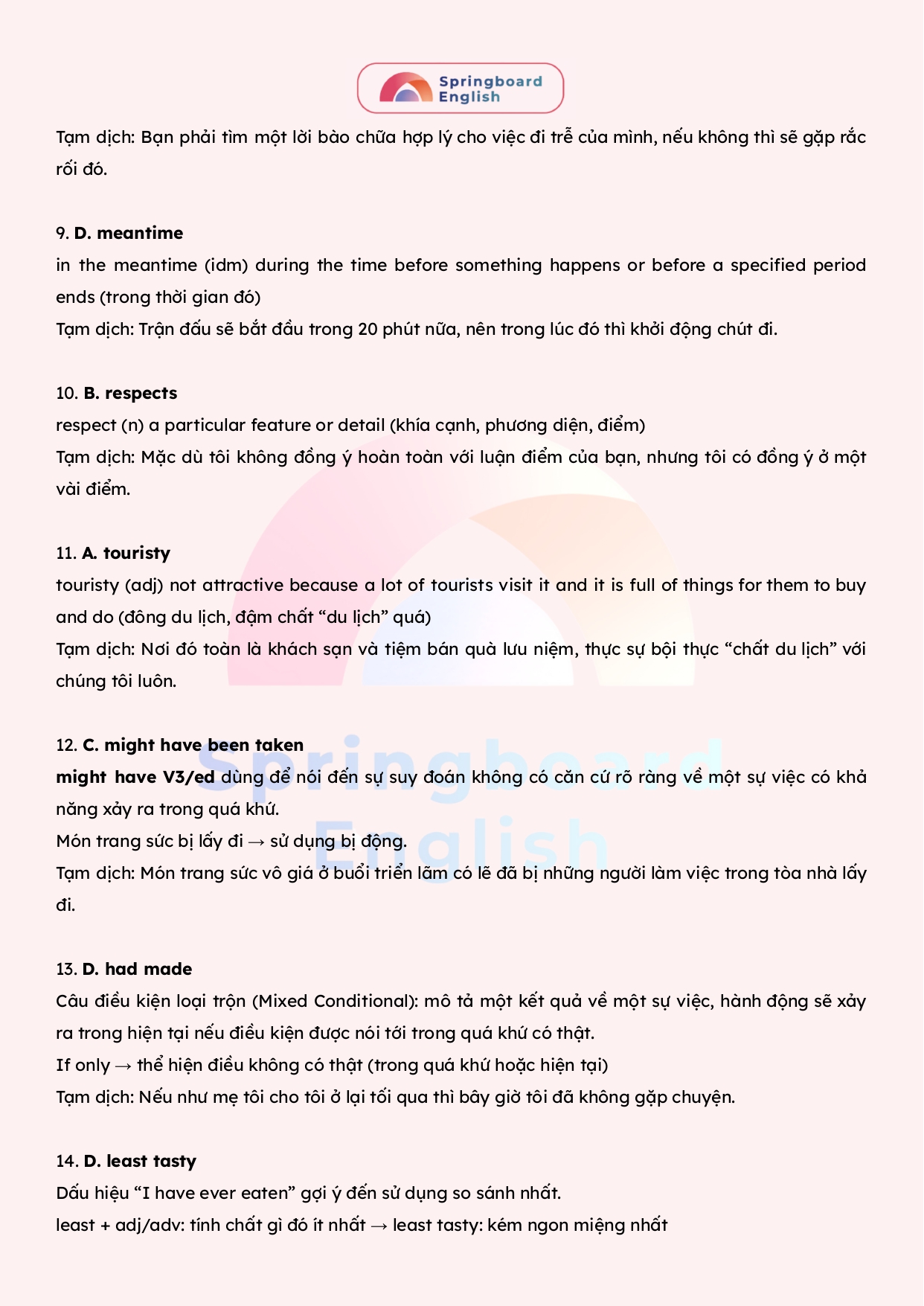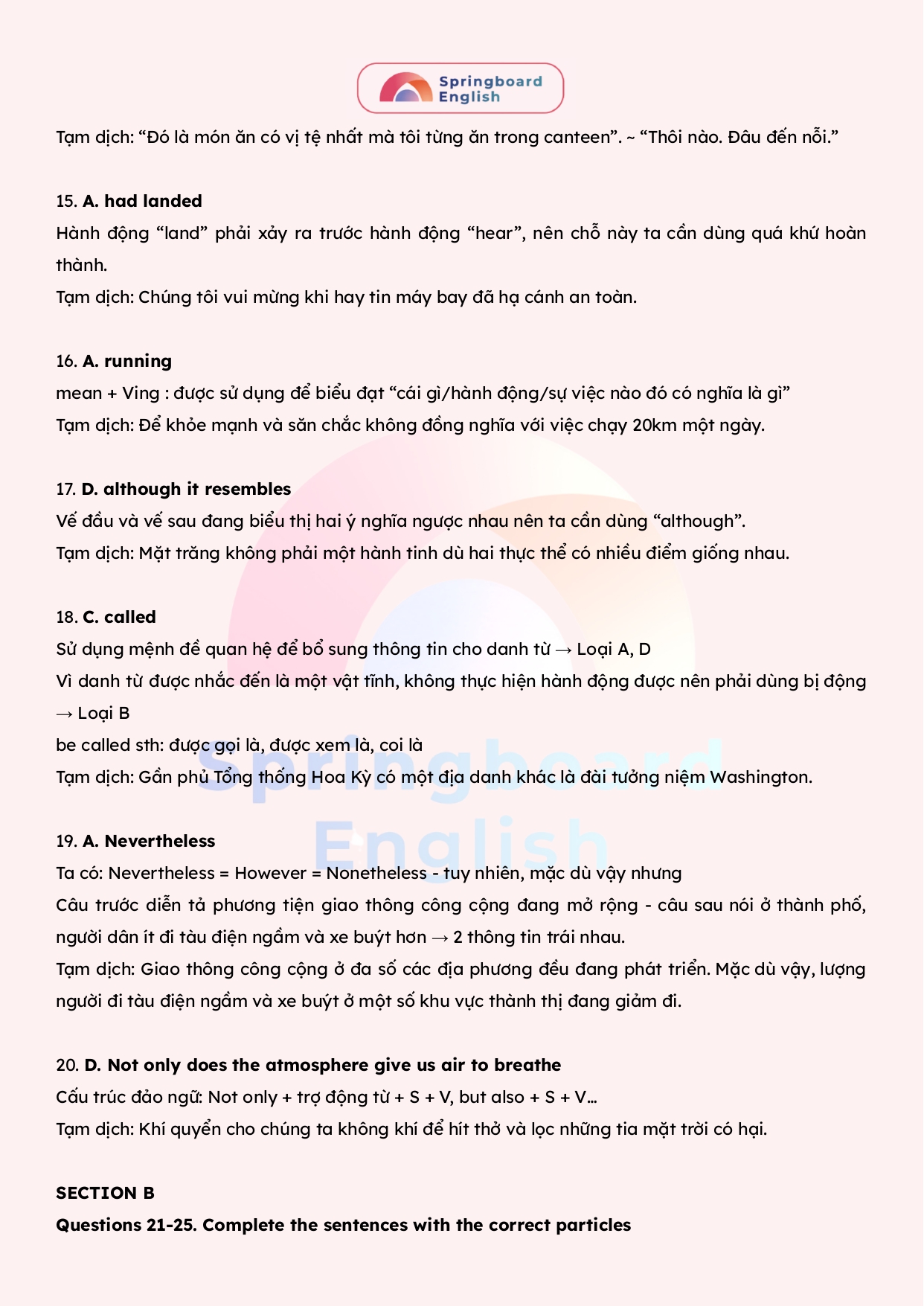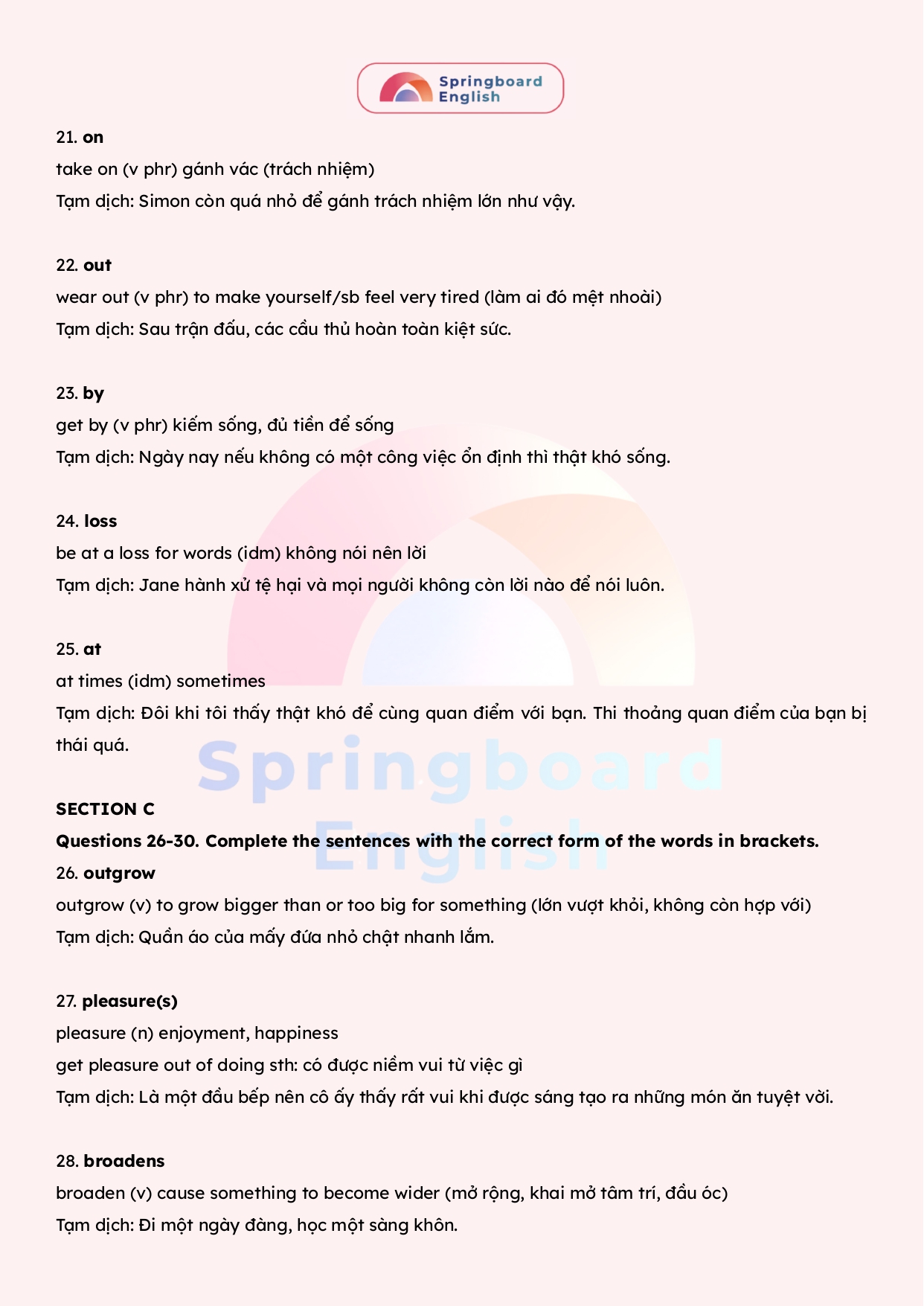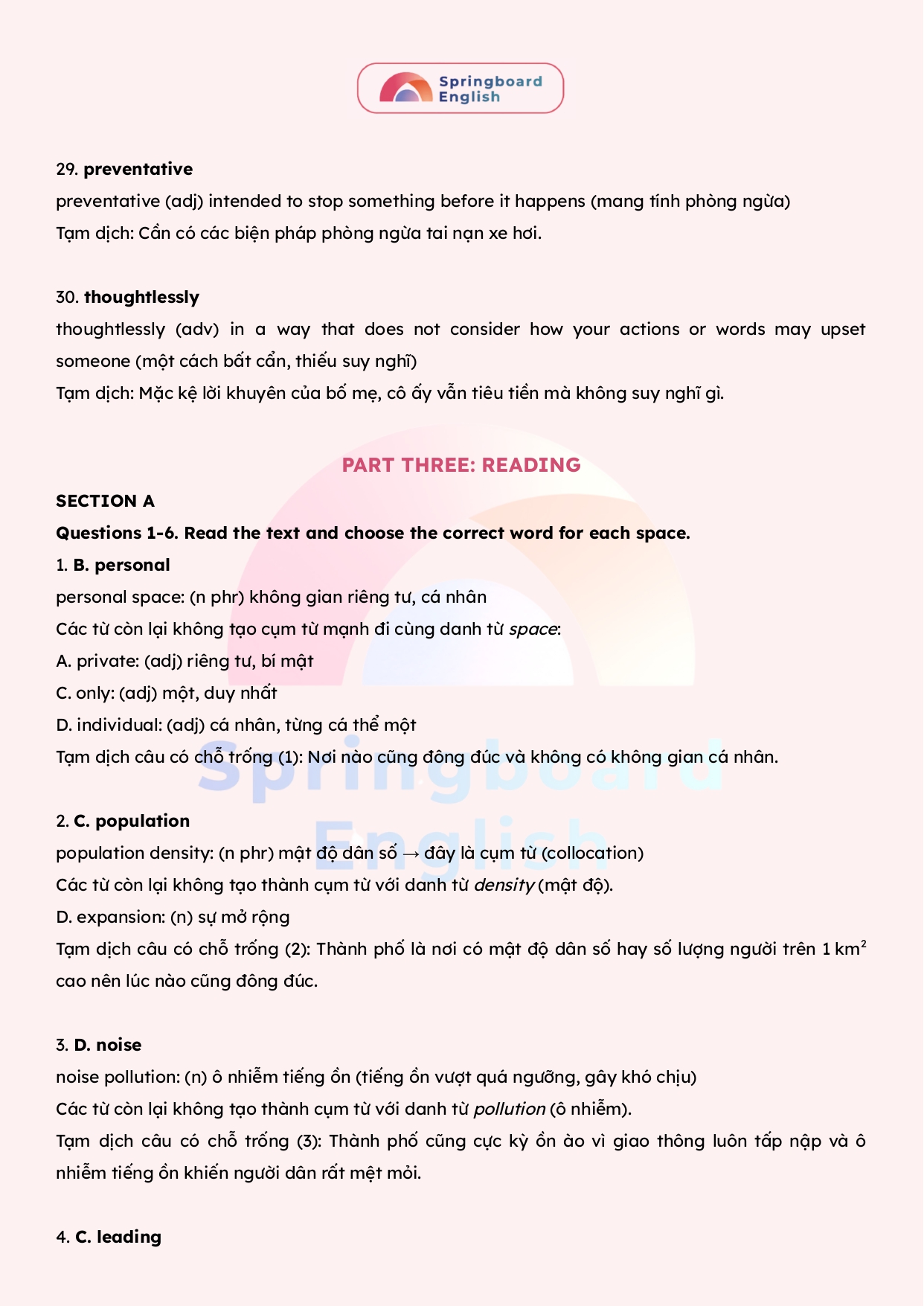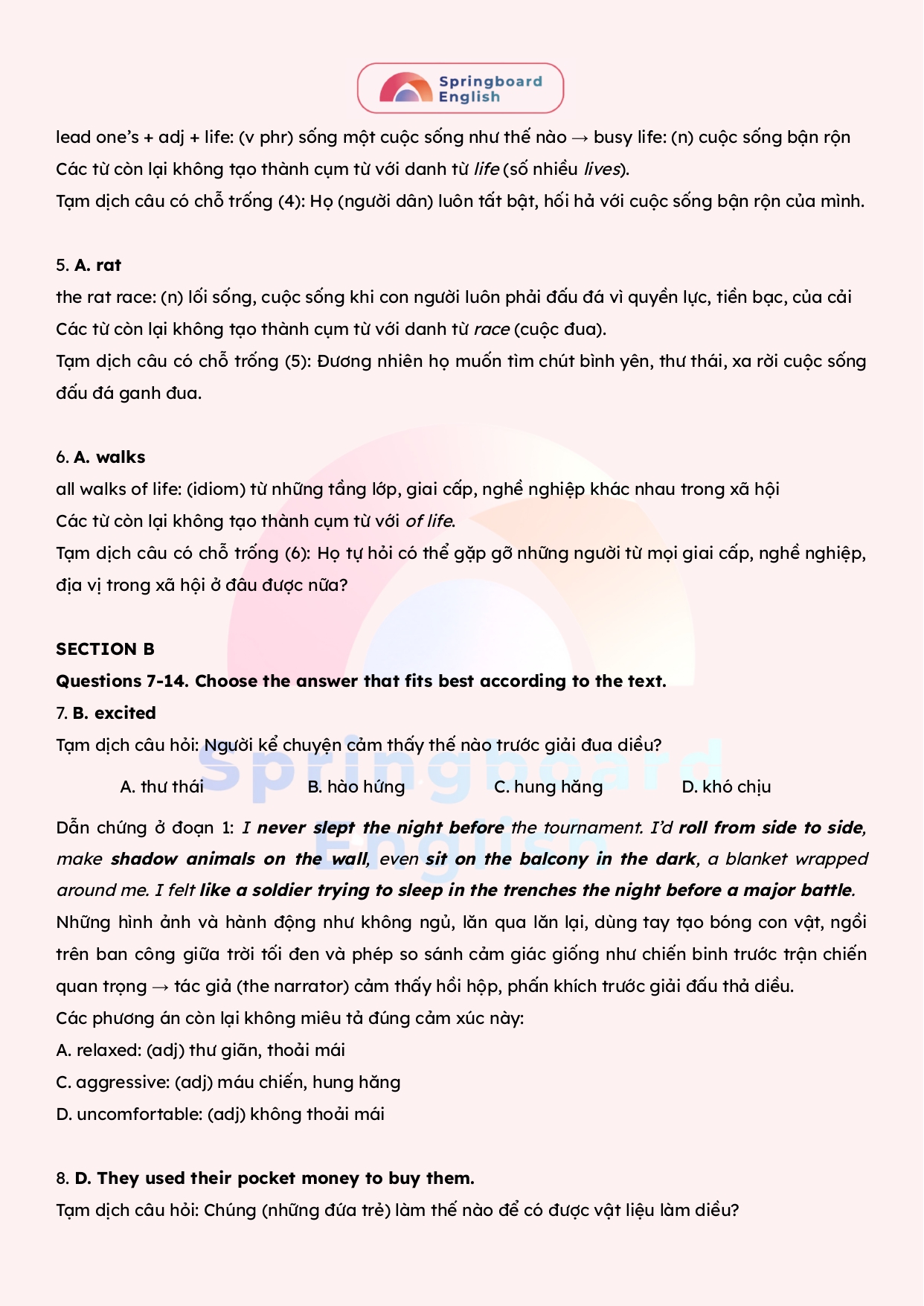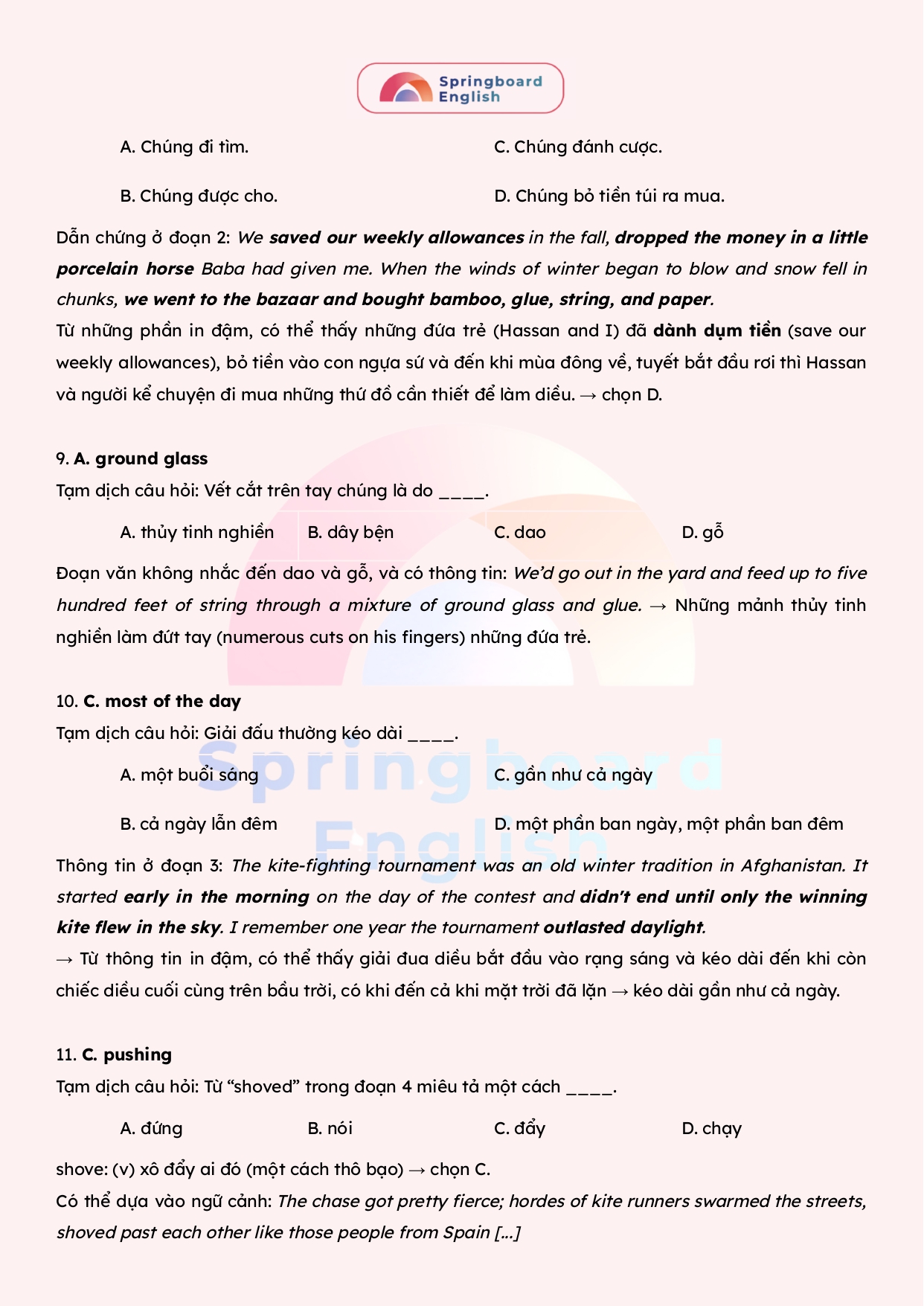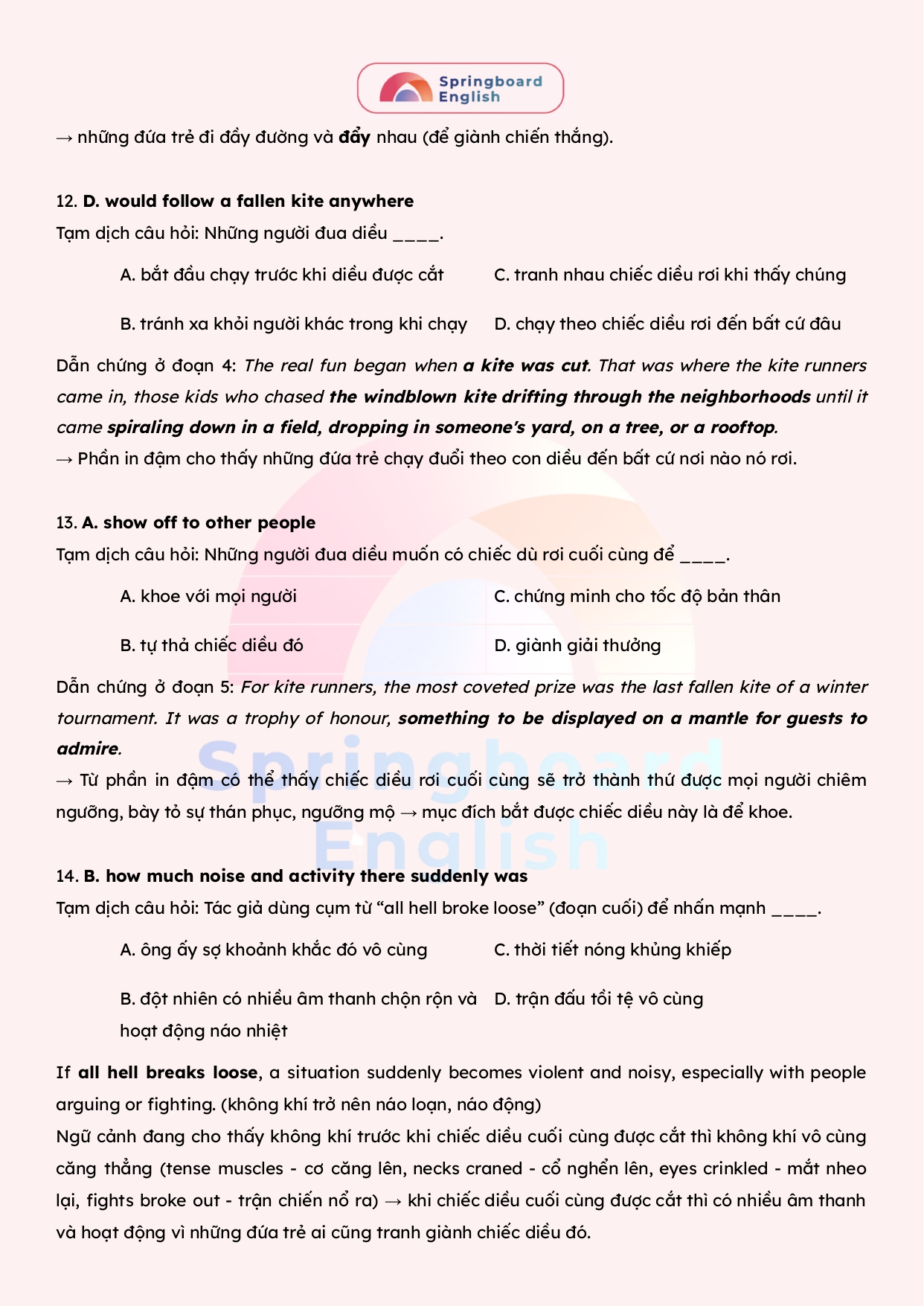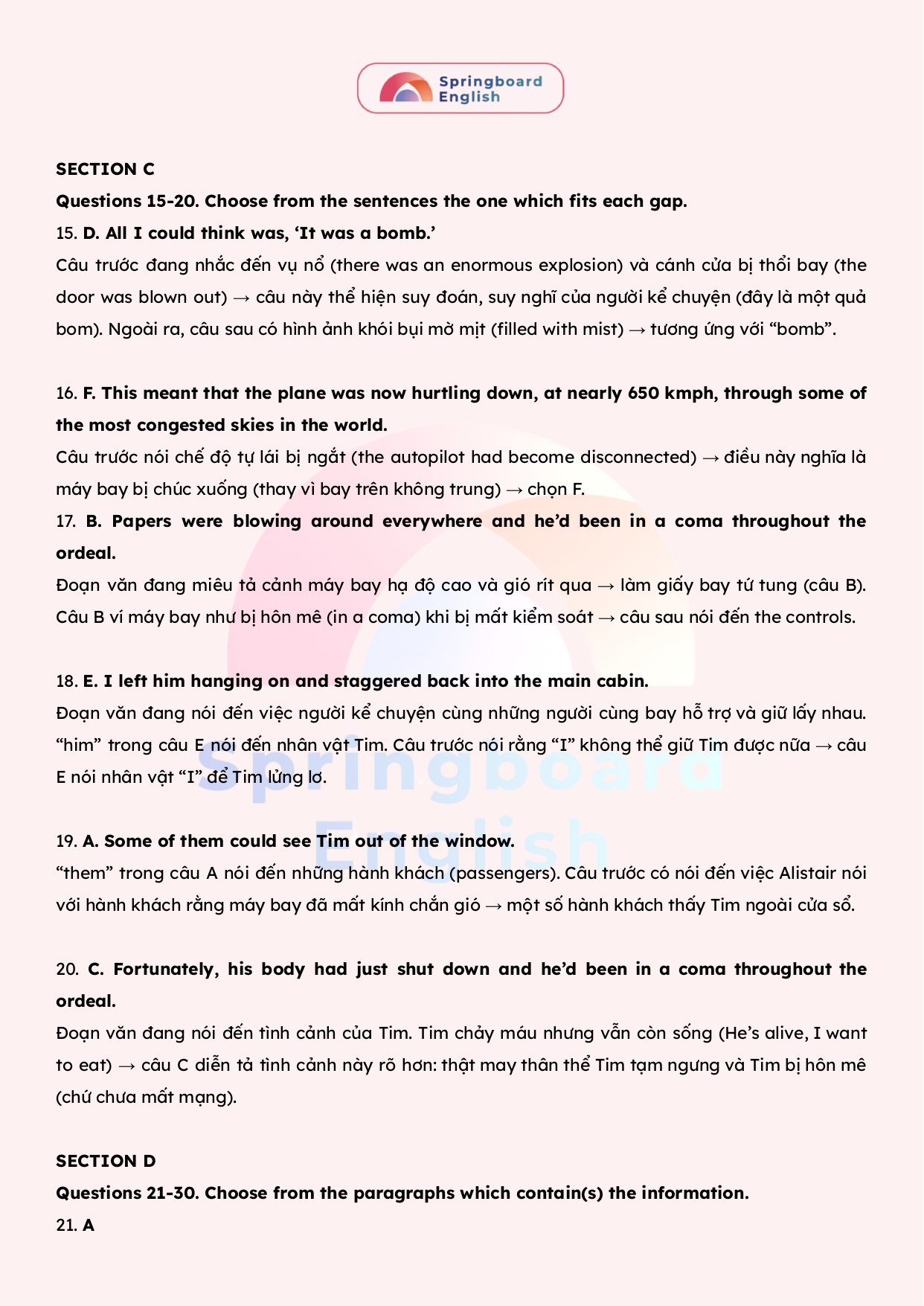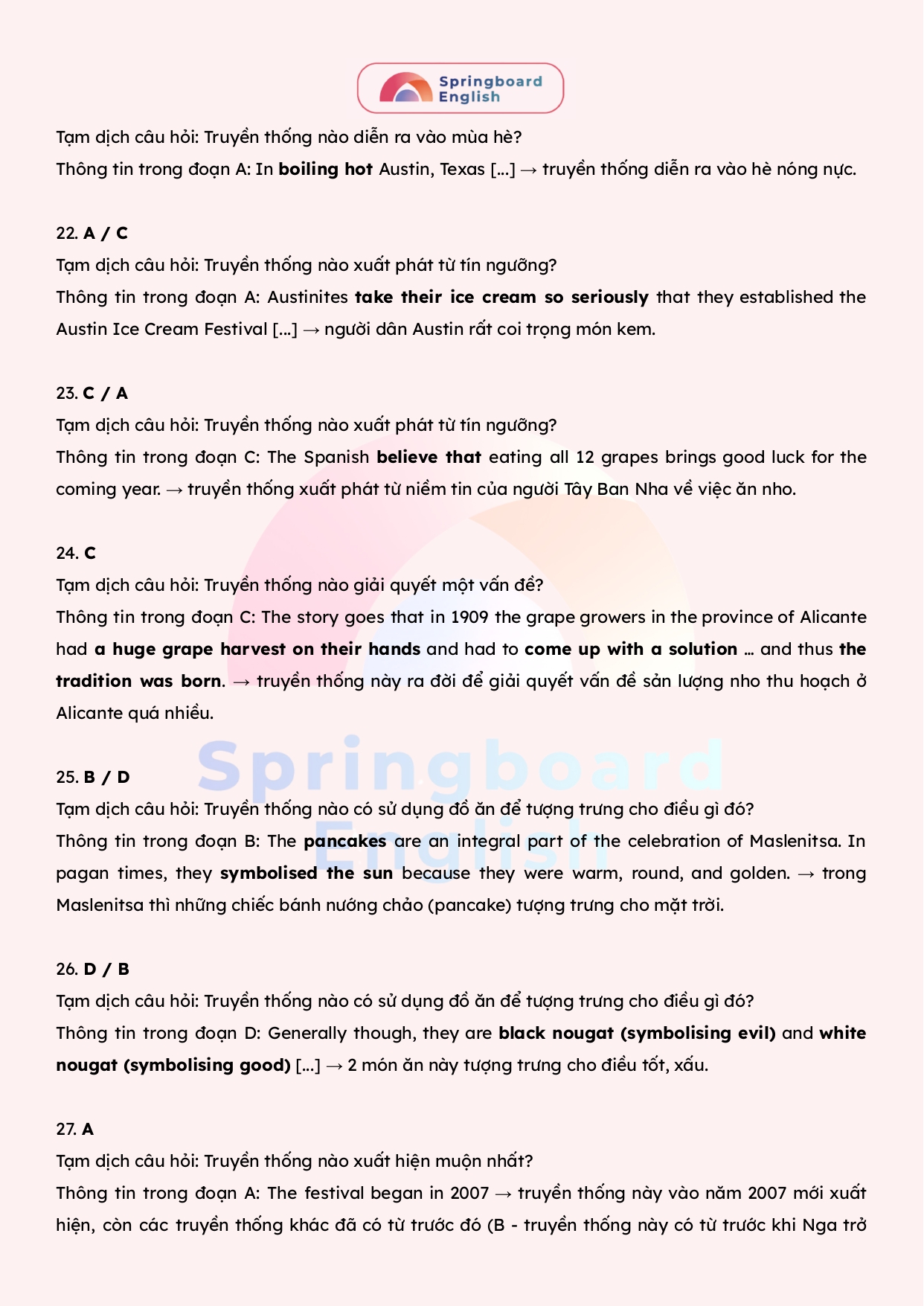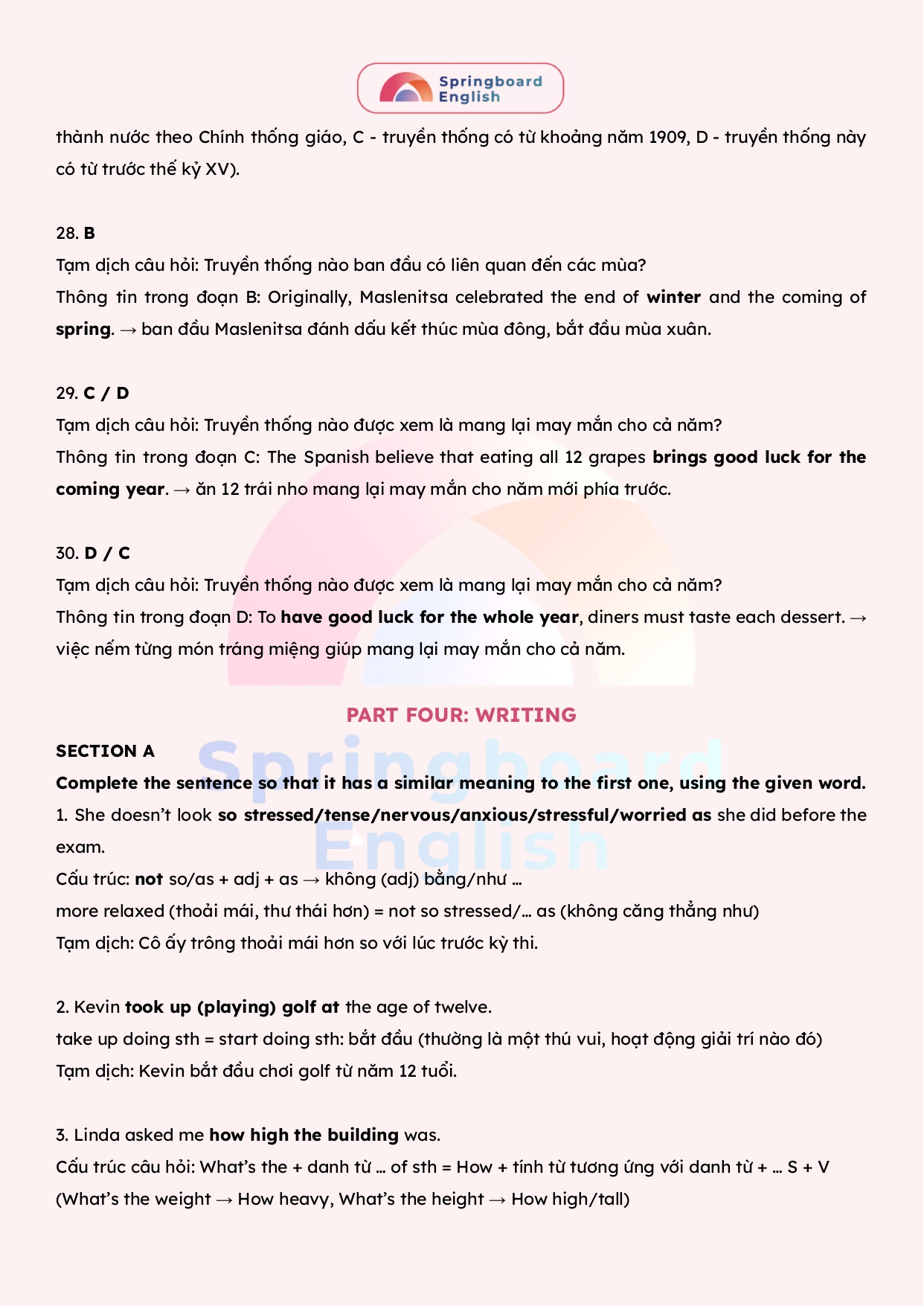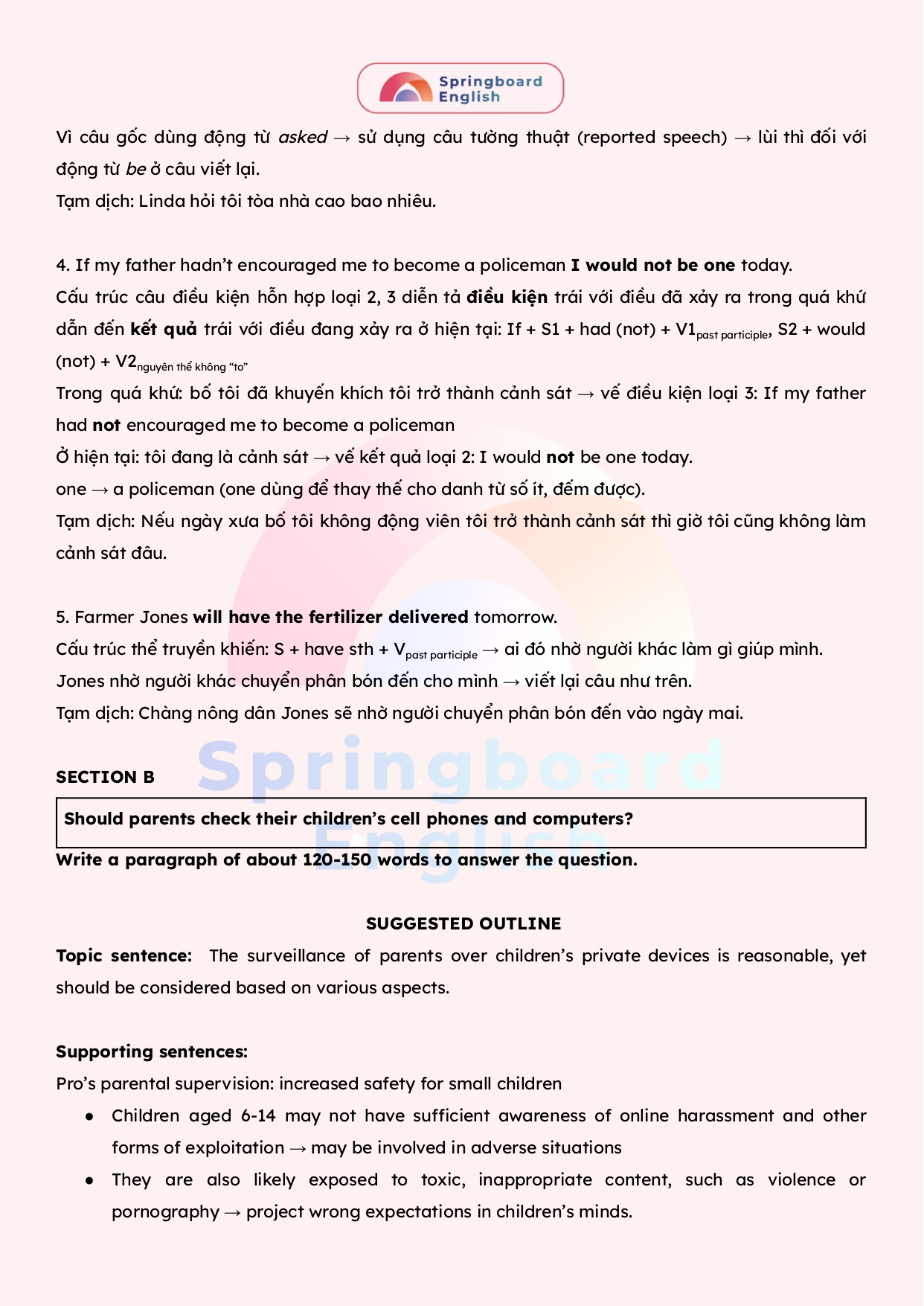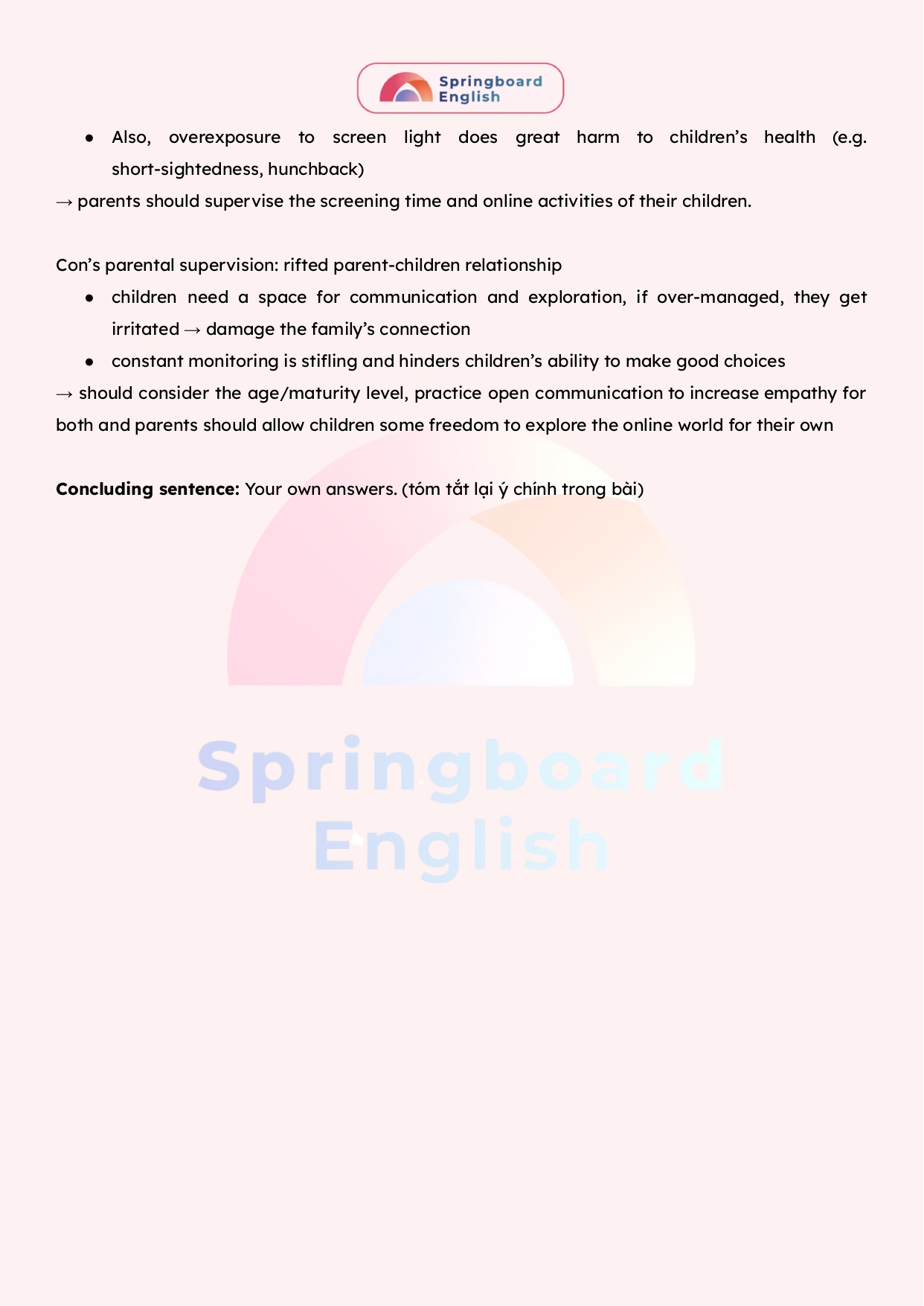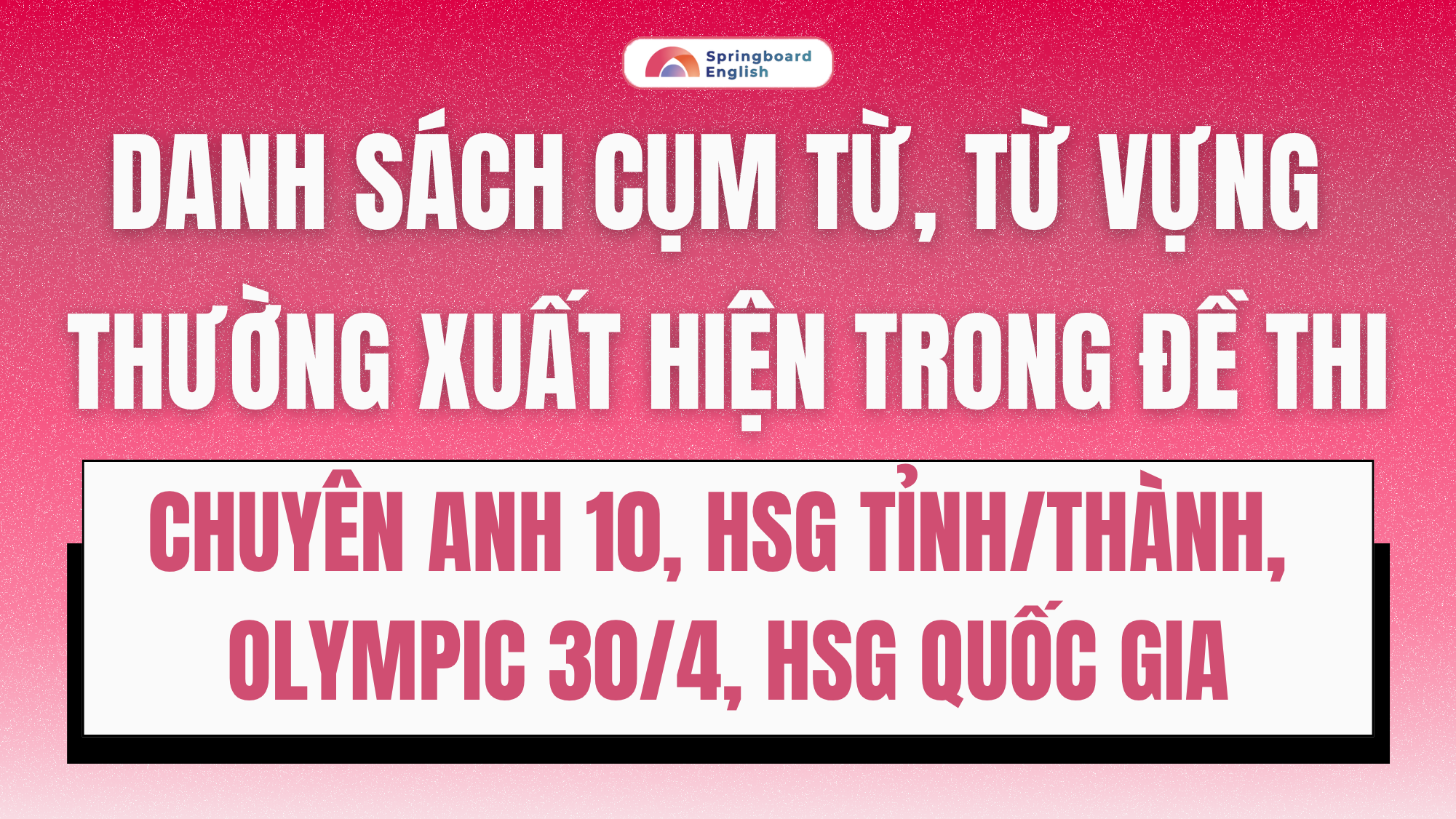Đề thi và Đáp án Chi tiết Kì thi Chuyên Anh 10, Chuyên Nguyễn Bỉnh Khiêm - Vĩnh Long năm học 2024-2025
Trong bài viết này, Đội ngũ trung tâm Springboard (Nhà Xuân) xin chia sẻ đến các quý phụ huynh, thầy cô, các em học sinh Đề thi và Đáp án có giải thích chi tiết ở kì thi Chuyên Anh 10, Chuyên Nguyễn Bỉnh Khiêm – Vĩnh Long năm học 2024-2025.
Phần đáp án chi tiết được giới thiệu ở bài viết này là tài liệu được biên soạn trực tiếp bởi đội ngũ chuyên môn Nhà Xuân, đồng thời là bản cập nhật mới nhất trong năm 2024.
Kéo xuống dưới cùng để xem hết đáp án có giải thích chi tiết.
Đề thi Chuyên Anh 10, Chuyên Nguyễn Bỉnh Khiêm - Vĩnh Long 2024-2025
SỞ GIÁO DỤC VÀ ĐÀO TẠO VĨNH LONG ĐỀ THI CHÍNH THỨC (Đề thi gồm 04 phần, 08 trang) | KỲ THI TUYỂN SINH LỚP 10 THPT CHUYÊN Môn thi: TIẾNG ANH (Chuyên) Ngày thi: 01/06/2024 Thời gian làm bài: 120 phút, không kể thời gian phát đề | |
Điểm từng phần: 1. ………………… 2. ………………… 3. ………………… 4. ………………… Cộng: ……………. | Hướng dẫn thi nghe hiểu: · Thí sinh có 3 phút để nghiên cứu các câu hỏi. · Bài nghe gồm 3 phần (SECTION A, B và C), mỗi phần được nghe 2 lần. · Bắt đầu mỗi phần đều có thông báo (bằng Tiếng Anh) · Bắt đầu và kết thúc phần thi nghe là đoạn nhạc. | |
PART ONE: LISTENING (2 points)
SECTION A: You will hear people talking in five different situations. For questions 1-5, circle the best answer (A, B or C). You will listen to the recording twice.
You hear a man and woman talking. How does the man sound?
A. stubborn | B. modest | C. envious |
You hear a woman talking. What does she want to be?
A. a reporter | B. a columnist | C. a publisher |
You hear a man and woman What is the man worried about?
A. famine | B. drought | C. pollution |
You hear a woman talking. What is she not going to do?
A. exercise | B. take medicine | C. go on a diet |
You hear a man How does he feel about his work as a volunteer?
A. satisfied | B. depressed | C. anxious |
SECTION B: You will hear a man called Mark King talking about his work as a personal chef for celebrities. For questions 6-13, listen and complete the sentences with a word or short phrase. You will listen to the recording twice.
Mark originally worked as a(n) (6) before becoming a chef
It was Mark’s (7) that first got him into cooking
Mark mentions that he’s not allowed to tell us his clients’ (8) .
Mark describes working for a pop star as tough
Mark says that he had difficulty finding (9) for a tea party he was asked to organize
What Mark enjoys most about being a personal chef is the flexibility
Mark was (10) when he was personally selected to cook for the royal family
Mark uses the word (11) to describe the most important characteristic of a personal chef.
Mark talks about another personal chef who was (12) after doing an interview with a magazine.
Mark is considering writing (13) to further his future career.
SECTION C: You will hear a radio discussion about the media. For questions 14-20, listen and choose the best answer (A, B, C). You will listen to the recording twice.
What has Jenny not done since the programme ended?
A. presented a TV programme |
B. talked on radio and TV |
C. been recognised in the street |
What prompted Jenny to appear on the TV programme?
A. She had heard about the financial benefits for contestants. |
B. She felt she represented young British people. |
C. She thought she would learn more about herself. |
What worries Tony about the reality TV?
A. People develop very strong relationships on these programmes. |
B. The programmes should be more educational. |
C. People have to behave in ways that he disapproves of. |
What does Jenny say about nominating the other housemates?
A. It was difficult because it took place at the end of the day. |
B. The relationships they had developed made it difficult. |
C. It made it difficult for people at home to take it seriously. |
How does Tony react to the suggestion that everyone knows the show is a game?
A. He gives an example of negative behaviour in children. |
B. He questions whether all adults realise this. |
C. He doubts that children take the game seriously. |
How does Jenny think that young children benefit from the programme?
A. They develop useful social skills. |
B. They understand that they shouldn’t talk to strangers. |
C. They learn how to defend themselves. |
What does Airwave want?
A. a complete ban on this kind of programme |
B. a ban on these programmes in the early evening |
C. a ban on programmes involving young children |
PART TWO: USE OF LANGUAGE (3 points)
SECTION A
|
|
For questions 1-2, choose the word with a different pronunciation of the underlined part. For questions 3-4, choose a word which has a different position of stress from the rest.
For questions 5-20, choose the word or phrase that best completes each sentence.
Of course I you! We went to school together, didn’t we?
A. hold | B. consider | C. see | D. recognise |
I think the thing to do is phone before you go and ask for
A. sensitive | B. sensible | C. selfish | D. sympathetic |
The government major changes to the education system
A. informed | B. declared | C. announced | D. expressed |
You have to find a good for being late, otherwise you’ll get into
A. purpose | B. excuse | C. cause | D. objective |
Kick-off is in twenty minutes, so in the , do your warm-up
A. while | B. time | C. moment | D. meantime |
Even though I don’t agree with your overall argument, I do agree with you in some .
A. sides | B. respects | C. basis | D. grounds |
The place was full of hotels and shops selling souvenirs, and was much too for
A. touristy | B. beaten | C. modest | D. exclusive |
The priceless jewelry from the exhibition by people who worked in the
A. might have took | B. might have be taken |
C. might have been taken | D. might be taken |
If only my mother me stay in that night; I probably wouldn’t be in trouble
A. has made | B. was made | C. is made | D. had made |
– “That was the meal I have ever eaten in the school ”
– “Oh, come on. It wasn’t that bad.”
A. more tasty | B. tastier | C. less tasty | D. least tasty |
We were pleased to hear that the plane
A. had landed | B. was landed | C. has landed | D. was landing |
Being fit and healthy does not mean 20 km a
A. running | B. to run | C. that ran | D. being run |
The moon is not a planet the planets in many
A. resembling | B. which resembles | C. but resemblance to | D. although it resembles |
Near the White House is another famous landmark the Washington
A. is which | B. which call | C. called | D. it is called |
Public transport in most of the nation is expanding. , the use of subways and buses is declining in some metropolitan areas.
A. Nevertheless | B. Consequently | C. Despite the fact | D. Although |
, but it also filters out harmful sun
A. The atmosphere gives us air to breathe |
B. Not only the atmosphere gives us air to breathe |
C. The atmosphere which gives us air to breathe |
D. Not only does the atmosphere give us air to breathe |
SECTION B: For questions 21-25, complete the sentences with the correct particles.
Examples:
You should read the introduction at the beginning of the
I really need to go on a diet before the holiday.
Simon is too young to take … such a big responsibility.
After the match the players were completely worn ...
It is not easy to get … these days unless you have a secure job.
Jane’s bad behavior left everyone at … for words.
I find it very difficult to agree with you … times. Your views can sometimes be extreme.
SECTION C: For questions 26-30, complete the sentences with the correct form of the words in brackets. There is an example at the beginning (0).
0. The government should preserve historic buildings in the (history)
Children … their clothes quickly. (grow)
Being a cook, she gets … a lot of out of creating amazing dishes. (please)
Traveling … our minds. (broad)
We should take … measures to stop car accidents. (prevent)
In spite of her parents’ advice, she keeps spending her money ... (thought)
PART THREE: READING (3 points)
SECTION A: For questions 1-6. Read the text below and choose the correct word for each space. Write your answers in the numbered boxes.
Pushing and shoving. Stress and anxiety. For many people, that’s what city living is. There are crowds everywhere and there’s very little (1) space. Cities like Shanghai, Cairo, and Mexico City have a high (2) density, that is, the number of people per square kilometer, so they are always crowded. In order to provide accommodation for millions of city dwellers, apartment buildings have sprung up everywhere and some cities have become concrete jungles. Cities are also incredibly noisy due to the constant traffic and such
(3) pollution often leads to stress for the inhabitants. They’re always rushing here and there, (4)
their busy lives. Surely they want some peace and quiet, away to escape the (5) race. Interestingly, however, there are people who thrive in such environments. New Yorkers, for example, enjoy living life in the fast lane and taking advantage of everything the city has to offer. Where else, they ask, would they come across the people from all (6) of life? And where else could they make their dreams come true?
1. | A. private | B. personal | C. only | D. individual |
2. | A. number | B. people | C. population | D. expansion |
3. | A. sound | B. human | C. hearing | D. noise |
4. | A. dealing | B. walking | C. leading | D. watching |
5. | A. rat | B. cat | C. horse | D. dog |
6. | A. walks | B. works | C. departments | D. stages |
SECTION B: For questions 7-14. You are going to read an extract from a novel. Choose the answer (A, B, C or D) which you think fits best according to the text. Write your answers in the numbered boxes.
Every winter, districts in Kabul held a kite-fighting tournament. And if you were a boy living in Kabul, the day of the tournament was undeniably the highlight of the cold season. I never slept the night before the tournament. I’d roll from side to side, make shadow animals on the wall, even sit on the balcony in the dark, a
blanket wrapped around me. I felt like a soldier trying to sleep in the trenches the night before a major battle. And that wasn’t so far off. In Kabul, fighting kites was a little like going to war.
As with any war, you had to ready yourself for battle. For a while, Hassan and I used to build our own kites. We saved our weekly allowances in the fall, dropped the money in a little porcelain horse Baba had brought one time from Herat. When the winds of winter began to blow and snow fell in chunks, we undid the snap under the horse’s belly. We went to the bazaar and bought bamboo, glue, string, and paper. We spent hours every day shaving bamboo for the center and cross spars, cutting the thin tissue paper which made for easy dipping and recovery. And then, of course, we had to make our own string, or tar. If the kite was the gun, then tar, the glass- coated cutting line, was the bullet in the chamber. We’d go out in the yard and feed up to five hundred feet of string through a mixture of ground glass and glue. We’d then hang the line between the trees, leave it to dry. The next day, we’d wind the battle-ready line around a wooden spool. By the time the snow melted and the rains of spring swept in, every boy in Kabul bore telltale horizontal gashes on his fingers from a whole winter of fighting kites. I remember how my classmates and I used to huddle, compare our battle scars on the first day of school. The cuts stung and didn’t heal for a couple of weeks, but I didn’t mind. They were reminders of a beloved season that had once again passed too quickly. Then the class captain would blow his whistle and we’d march in a single file to our classrooms, longing for winter already, greeted instead by the specter of yet another long school year.
But it quickly became apparent that Hassan and I were better kite fighters than kite makers. Some flaw or other in our design always spelled its doom. So Baba started taking us to Saifo’s to buy our kites. Saifo was a nearly blind old man who was a moochi by profession – a shoe repairman. But he was also the city’s most famous kite maker, working out of a tiny hovel on Jadeh Maywand, the crowded street south of the muddy banks of the Kabul River. I remember you had to crouch to enter the prison cell–sized store, and then had to lift a trapdoor to creep down a set of wooden steps to the dank basement where Saifo stored his coveted kites. Baba would buy us each three identical kites and spools of glass string. If I changed my mind and asked for a bigger and fancier kite, Baba would buy it for me – but then he’d buy it for Hassan too. Sometimes I wished he wouldn’t do that. Wished he’d let me be the favorite.
The kite-fighting tournament was an old winter tradition in Afghanistan. It started early in the morning on the day of the contest and didn’t end until only the winning kite flew in the sky – I remember one year the tournament outlasted daylight. People gathered on sidewalks and roofs to cheer for their kids. The streets filled with kite fighters, jerking and tugging on their lines, squinting up to the sky, trying to gain position to cut the opponent’s line. Every kite fighter had an assistant – in my case, Hassan – who held the spool and fed the line.
One time, a bratty Hindi kid whose family had recently moved into the neighborhood told us that in his hometown, kite fighting had strict rules and regulations. “You have to play in a boxed area and you have to stand at a right angle to the wind,” he said proudly. “And you can’t use aluminum to make your glass string.”
Hassan and I looked at each other. Cracked up. The Hindi kid would soon learn what the British learned earlier in the century, and what the Russians would eventually learn by the late 1980s: that Afghans are an independent people. Afghans cherish custom but abhor rules. And so it was with kite fighting. The rules were simple: No rules. Fly your kite. Cut the opponents. Good luck.
Except that wasn’t all. The real fun began when a kite was cut. That was where the kite runners came in, those kids who chased the windblown kite drifting through the neighborhoods until it came spiraling down in a field, dropping in someone’s yard, on a tree, or a rooftop. The chase got pretty fierce; hordes of kite runners swarmed the streets, shoved past each other like those people from Spain I’d read about once, the ones who ran from the bulls. One year a neighborhood kid climbed a pine tree for a kite. A branch snapped under his weight and he fell thirty feet. Broke his back and never walked again. But he fell with the kite still in his hands. And when a kite runner had his hands on a kite, no one could take it from him. That wasn’t a rule. That was custom.
For kite runners, the most coveted prize was the last fallen kite of a winter tournament. It was a trophy of honor, something to be displayed on a mantle for guests to admire. When the sky cleared of kites and only the final two remained, every kite runner readied himself for the chance to land this prize. He positioned himself at a spot that he thought would give him a head start. Tense muscles readied themselves to uncoil. Necks craned. Eyes crinkled. Fights broke out. And when the last kite was cut, all hell broke loose.
How did the narrator feel before the kite-flying tournament?
A. relaxed | B. excited | C. aggressive | D. uncomfortable |
How did they get the materials to make their kites with?
A. They found them. | B. They were given them. |
C. They gambled for them. | D. They used their pocket money to buy them. |
The cuts on their hands were caused by .
A. ground glass | B. string | C. knives | D. wood |
The tournament would usually take .
A. a morning | B. all day and all night |
C. most of the day | D. part of the day and part of the night |
The word “shoved” (paragraph 4) describes a way of .
A. standing | B. talking | C. pushing | D. running |
The kite runners .
A. started running before the kite had been cut | B. kept away from others as they ran |
C. fought for the fallen kites when they found them | D. would follow a fallen kite anywhere |
The kite runners wanted the last fallen kite in order to .
A. show off to other people | B. fly it themselves |
C. prove their speed | D. get a prize |
The writer uses the phrase “all hell broke loose” (the last paragraph) to emphasize .
A. how much he feared this moment | B. how much noise and activity there suddenly was |
C. how hot it was | D. how terrible the fighting was |
SECTION C: For questions 15-20. Six sentences have been removed from the article. Choose from the sentences (A-F) the one which fits each gap (15-20). Write your answers in the numbered spaces.
A. Some of them could see Tim out of the
B. Papers were blowing around everywhere and it was impossible to hear air-traffic
C. Fortunately, his body had just shut down and he’d been in a coma throughout the
D. All I could think was, ‘It’s a ’
E. I left him hanging on and staggered back into the main
F. This meant that the plane was now hurtling down, at nearly 650 kmph, through some of the most congested skies in the world.
I think the captain’s dead
Nigel Ogden had been an air steward for twelve years when the unthinkable happened. Here, he describes how he saved his pilot’s life.
I think about what happened every day. It was a beautiful morning and I was up early because I was working on the British Airways 7.30 a.m. flight from Birmingham to Malaga. I was thirty-six, had been an air steward for twelve years and loved my job with a passion. I expected that day to be especially enjoyable. It was a holiday flight, so the eighty-one passengers would be relaxed, and the crew had worked together for years.
It was thirteen minutes after take-off. We had just reached 5,200 metres and everything had been going well. I went through to the cockpit and asked the pilots if they’d like tea. I was just stepping out, with my hand on the door handle, when there was an enormous explosion and the door was blown out of my hands. (15) The whole cabin was filled with mist for a second – then the plane started to plummet.
I whipped round, peering through the mist. I saw that the front windscreen had disappeared and Tim, the captain, was going out through it. I grabbed him round the waist to stop him being sucked out completely. At the same time, somehow, the autopilot had become disconnected and the flight door had landed on the controls. (16)
Everything was being sucked out of the aircraft. I was holding on like grim death but I could feel myself being pulled out, too. John – one of the other stewards – rushed in and grabbed my trouser belt to stop me slipping further.
The aircraft was losing height so quickly, however, that the pressure soon equalised and the wind started rushing in at 620 kph and -17°C. (17) Simon, another steward, came rushing through and, with John, managed to free the controls so that Alistair, the co-pilot, could get the autopilot back on.
I was still holding onto Tim, but the pressure made him weigh the equivalent of 225 kilograms. My arms were getting colder and colder and I could feel them being pulled out of their sockets. I felt my arms weaken and Tim slipping. I thought I was going to lose him, but he ended up bent in a u-shape around the windows, his face banging against the window with blood coming out of his nose and the side of his head. His arms were flailing around and they seemed about two metres long. I couldn’t hold on anymore, so Simon strapped himself into the third pilot’s seat and took a hold of Tim’s ankles. (18)
By now, Alistair was in communication with air-traffic control, who were talking him through the landing. He asked for a runway of 2,500 metres because he was worried that the plane was so heavy with fuel, a tyre would burst or it would go off the runway, but all they could give us was 1,800 metres.
Over the intercom, Alistair told the passengers we’d lost the windscreen. (19) The cabin was silent as the grave as we walked up and down, preparing everyone for an emergency landing. I remember one man at the very back, with a little baby on his knee, saying to me: ‘We’re going to die,’ and I said: ‘No, we’re not,’ lying through my teeth.
It seemed impossible, but Alistair did the most amazing landing – completely smooth and stopping the aircraft only three-quarters of the way down the runway. The entire episode from the explosion to the landing had lasted just eighteen minutes, but it seemed like hours.
The paramedics came on board and put Tim on a stretcher. He was lying there, covered in blood, but to my amazement I heard him say: ‘I want to eat.’ I just exclaimed: ‘Typical pilot!’ (20) I went out onto the front steps, and shouted to the others, ‘He’s alive!’ and then I cried my eyes out.
SECTION D: You are going to read an article about four different food traditions. For questions 21-30, choose from the paragraphs (A-D). The paragraphs may be chosen more than once.
Which tradition(s): |
|
• takes place in the summer? | 21. |
• do not have a religious foundation? | 22. – 23. |
• solved a problem? | 24. |
• include food that represent something? | 25. – 26. |
• is the newest? | 27. |
• was originally connected to the seasons? | 28. |
• are said to bring year-long good fortune? | 29. – 30. |
Food Traditions Around the World
A. Austin Ice Cream Festival, USA
In boiling hot Austin, Texas, ice cream is more than a treat, it is a necessity. Austinites take their ice creams so seriously that they established the Austin Ice Cream Festival, where contestants compete to make the best homemade ice cream the old-fashioned way. The festival began in 2007 and since then, hundreds of hopefuls have taken part. Contestants must use their own recipes and bring their own ingredients, ice-cream makers and utensils. The festival organisers bring the ice. Once everyone has made their ice cream, the judges conduct a taste test and the winner is awarded The Spoon. Over the years, some astonishing ingredients have been used, but perhaps none stranger than 2009’s winning entry, Bacon Maple Crunch. Americans say everything tastes better with bacon and it seems that includes ice cream too!
B. Maslenitsa, Russia
Maslenitsa week, also known as Pancake week, began as a pagan ritual and was later adopted by the Eastern Orthodox religion in Russia. Originally, Maslenitsa celebrated the end of winter and the coming of spring. Once Russia became an Orthodox country, Maslenitsa was absorbed into the celebrations that took place before the start of the 40-day Easter fast, known as Lent. Meat is forbidden in the week before the start of Lent, but eggs, butter, milk and other dairy products are permitted. The pancakes called blini are made from flour, milk and eggs and the name for the festival comes from the Russian word for butter, maslo. The pancakes are an integral part of the celebration of Maslenitsa. In pagan times, they symbolised the sun because they were warm, round, and golden. Today, blini are offered to friends and family throughout the week and are eaten with jam, sour cream, caviar, mushrooms, and of course, lots of butter!
C. Nochevieja, Spain
New Year’s Eve in Spain is called Nochevieja, which means The Old Night. Before midnight on New Year’s Eve, thousands of people gather in Madrid’s central square, Puerta del Sol, to wait for the chimes of the clock on the tower that dominates the square. There is a sense of excitement and anticipation as midnight approaches. Finally, at the stroke of midnight and the dawn of the new year, everyone eats twelve grapes, one for each chime of the clock. The Spanish believe that eating all 12 grapes brings good luck for the coming year. Though you might think the 12 ‘lucky grapes’ are a religious tradition, they do, in fact, have a commercial basis. The story goes that in 1909 the grape growers in the province of Alicante had a huge grape harvest on their hands and had to come up with a solution… and thus the tradition was born.
D. The Thirteen Desserts, France
At Christmas in Provence, in the south of France, there is a tradition of a Christmas Eve meal containing no meat followed by 13 desserts. To have good luck for the whole year, diners must taste each dessert. The desserts can vary depending on region and family tradition. Generally though, they are black nougat (symbolising evil) and white nougat (symbolising good); dried figs, raisins, dates; almonds, hazelnuts or walnuts; fruit such as oranges, apples, tangerines, pears, grapes and melons; quince paste; a cake made with orange flower water and olive oil;
and marzipan, an almond-paste pastry, which is the most popular of the desserts. Marzipan was created in the 15th century, initially without almonds. Once almonds were brought to Provence in the 16th century, ground almond was included in the recipe and it became world famous.
PART FOUR: WRITING (2 points)
SECTION A: Complete the second sentence so that it has a similar meaning to the first sentence, using the word given. Write between two to five words.
She looks more relaxed than she did before the exam. (so)
She doesn’t look she did before the exam.
Kevin started playing golf when he was (took)
Kevin the age of twelve.
“What’s the height of the building?” Linda asked me. (high)
Linda asked me was.
I am a policeman today because my father encouraged me to become (would)
If my father hadn’t encouraged me to become a policeman today.
They will deliver the fertilizer to Farmer Jones (have)
Farmer Jones tomorrow.
SECTION B:
Should parents check their children’s cell phones and computers?
Write a well-organized paragraph of about 120-150 words to answer the question. Use specific reasons and examples to support your answer.
HẾT
File PDF - Đề thi Chuyên Anh 10, Chuyên Nguyễn Bỉnh Khiêm, Vĩnh Long 2024-2025
File PDF đề thi
Cảm ơn quý phụ huynh, thầy cô, và các em học sinh đã tham khảo tài liệu được biên soạn bởi Nhà Xuân.
Với nỗ lực để luôn tạo ra những bài giảng – học liệu hay nhất dành cho kì thi chuyên Anh – HSG tiếng Anh cấp tỉnh/thành phố đến cấp Quốc Gia, đội ngũ mentors trung tâm Springboard (Nhà Xuân) luôn biên soạn những tài liệu mới nhất với giải thích tận tâm – chi tiết.
Quý phụ huynh/ quý thầy cô/các em học sinh có thể truy cập các kênh sau để cập nhật tài liệu mới nhất từ Nhà Xuân:
- Facebook page Springboard English: Trang Facebook chính thức của Nhà Xuân
- Facebook group Springboard Connects: Nhóm trao đổi – tư vấn học tập, và tài liệu học tập với 30.000+ thành viên
- Website học liệu – springboard.vn: Trang web tổng hợp tất tần tật các tài liệu được biên soạn chi tiết bởi Springboard (Nhà Xuân).
Liên hệ:
- Gửi đề thi mới nhất cho Nhà Xuân về địa chỉ: contact@springboard.vn
- Tham khảo và đăng ký tư vấn các lớp học ôn thi Chuyên Anh – Thi HSG Tiếng Anh cấp THPT – Thi Olympic 30/4 và Duyên Hải Bắc Bộ – Thi HSG cấp Quốc Gia tại: Form đăng ký tư vấn.
Thân ái,
Đội ngũ trung tâm Springboard (Nhà Xuân)



